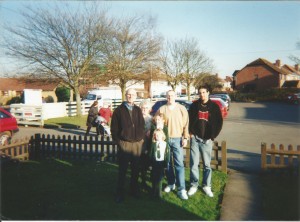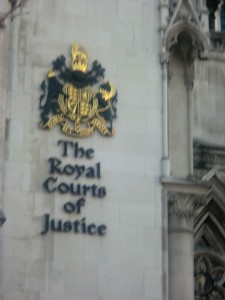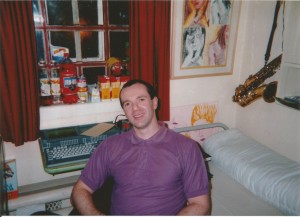A Shoddy Prosecution
by Satish Sekar © Satish Sekar (November 14th 2008)
Responsibilities
In May 2002 the Criminal Cases Review Commission (CCRC) referred the case of Gary Mills and Tony Poole back to the Court of Criminal Appeal, using the very arguments that it had ignored for almost three years – a failure it must accept responsibility for. Baron (Harry) Woolf, the then Lord Chief Justice and Mr Justice (Sir Duncan) Ousley had asked, rather than told the CCRC to look at the arguments again.
They did so. A few months later the CCRC referred the convictions of Mills and Poole back to the Court of Appeal. They cited the very arguments they had spent three years ignoring, while insisting on answering and rejecting points that had never been made and would not have been because that had no merit whatsoever.
The actual points made on behalf of Mills was that the summary of Jukeʼs statements that was put to Mills in interview by Detective Sergeant John Jeynes as he then was not an accurate summary of Jukeʼs second statement as Lord Justice (Sir Phillip) Otton et al had claimed, it was grossly inaccurate. Far from dispelling any prejudice from the non-disclosure of Jukeʼs statements, this passage added to that prejudice and plainly so.
Gary Millsʼ lawyers could not have advised him to call Juke as a defence witness without knowing what he had told the police. Jukeʼs assurances were not enough, especially when Mills must have thought that Jukes had said what Jeynes told him in that interview and if he thought that, then he must have believed that Jukes did not actually support his claims of self-defence.
Cumulative Effect
In those circumstances, Mills had no choice. Jukes could not be called. Millsʼ defence had been bluffed into not calling Jukes and that could not have happened without the refusal to disclose Jukesʼ statements. The points made by Bhatt were obvious. Mills could not have called Jukes as a witness without knowing what he had told police. Taking a defence statement was no safeguard as they still did not know if they had been told what he told the police.
Only disclosure could help, but the 1996 appeal judges upheld the Prosecutorʼs Discretion to withhold statements and then misrepresented the interview passage as an accurate summary of Jukeʼs statements when it was not.
The fact that this deception did not result in a confession is totally irrelevant, no matter how many times the CCRC repeated it. The important points were that Mills could not have called Jukes, thinking that he did not support his claims of self-defence and furthermore, Jeynesʼ ʻdeceptiveʼ summary made that inevitable and further questioned the integrity of the investigation.
It also added to the cumulative effect of the malpractice in this inquiry compromising its integrity beyond repair. It is difficult to believe that the CCRC repeatedly failed to grasp the actual points that Bhatt had made.
Squaring the Circle
The appeal judges considered whether the cumulative effect of the malpractice in this case rendered the convictions unsafe in April 2003. In effect they had to pass judgment on what a former Commissioner of the Metropolitan Police once infamously called, ʻnoble cause corruption.ʼ
Lord Justice (Sir Robin) Auld, sitting with Mr Justices (Sir Brian) Keith and (Sir Peregrine) Simon had the opportunity to say loud and clear that there is nothing noble about corruption, but sadly they lacked the courage to do so. They also failed to criticise serious failings of their colleagues in the previous appeal.
Lord Justice Otton had previously quoted the definition of an abuse of process as ʻsomething so unfair and wrong that the court should not allow the prosecutor to proceed with what is in all other respects a regular proceedingʼ. He described Gladdingʼs conduct as ʻreprehensibleʼ and ʻmost unwise.ʼ He did not describe it as perjury and perverting the course of justice.
Had he done so, it would have meant that perjury and perverting the course of justice were not acts so unfair and wrong that a prosecutor should intervene.
The 1996 judgment only made sense if Gladdingʼs conduct did not amount to perjury and perversion of the course of justice, but the 1998 libel trial showed that it did. The convictions should have been quashed on that alone, but it would require almost another five years for that to occur.
Reconciling the Irreconcilable
In his judgment Lord Justice Auld tried to reconcile these seemingly irreconcilable decisions. “The fact that Otton LJ, in giving the judgment of the Court, did not understandably feel able to give it the labels ʻperversion of the course of justiceʼ and ʻperjuryʼ in a proceeding to which he was not a party, does not affect the underlying conduct of which the first Court of Appeal was fully aware or its decision that it had not been such as to render the criminal trial an abuse of process or the convictions unsafe”.
This appears to be suggesting that perjury and perverting the course of justice are not acts so unfair and wrong that the court should intervene and that they do not constitute an abuse of due process of law. If perjury and perverting the course of justice are not abuses of due process of law, it is difficult to see what could ever constitute an abuse of due process, but unfortunately Auld was far from finished attempting to defend the indefensible.
During this appeal it became clear that the passage relied on by Otton to dismiss the 1996 appeal was itself inadmissible as hearsay evidence. Auld said, “Of course, the Court of Appeal did not know, and nor did the House of Lords, which was focusing on the single issue of non-disclosure before it, that DS Jeynes had misrepresented to Mills in interview some of what Juke had alleged in his second witness statement”.
Really? A simple solution to this problem would be for Court of Appeal judges and Law Lords to read passages of interview and witness statements before attempting to rely on them. Auld described that passage of interview as ʻcontaining a graphically phrased, inaccurate, damning and inadmissible accountʼ. However, he failed to refer to Ottonʼs previous description of that same passage: ʻMoreover, it was an accurate summary of the substance of Jukeʼs second statementʼ.
Errors of Judgement
The convictions were quashed on June 17th 2003. It has yet to receive the media scrutiny it deserves, which we hope can be put right even at this late stage. It involved shocking police malpractice: serious flaws in the trial process, a judgment in the first appeal that was either utterly dishonest or the judges did not read the material they relied on to dismiss the appeals and much more besides.
The House of Lords repeated the error of the appeal court, but despite changing the law because of it, wrongly ruled that Mills and Poole had suffered no miscarriage of justice. But there were more errors to come.
Tarnished at Every Level
The CCRC failed to realise the merits of submissions put to it, requiring a judicial review to persuade it to look at this case again and refer it back for appeal after wasting three years refusing to respond to the arguments that had actually been made. The judges at the second appeal seemed more concerned with protecting their colleagues from criticism than the interests of justice.
As the former Lord Chief Justice, Lord Woolf, said at the Judicial Review, “Almost every aspect of the prosecution is tarnished”. The failure to hold the criminal justice system accountable for the persistent failings that occurred in this case is a sad indictment both of that system and the media that allow such abuses to pass without comment.
Discredited System
Despite the decision of the libel trial jury Trevor Gladding has yet to face any charges. The Independent Police Complaints Commission (IPCC) agreed to supervise an investigation by the Metropolitan Police into Gladdingʼs conduct in 2004. It is unclear if it investigated other instances of dubious conduct such as that of Paine and Cheminais.
In fact it is unclear if the Met Police investigated anything at all. Nevertheless, four years after receiving the complaint, which was referred to it under the old discredited system which contributed to the demise of the Police Complaints Authority, the IPCC decided that no action would be taken against Gladding or any other officer without actually considering the merits of the evidence against him.[1]
Found Wanting
Despite the swingeing criticism of Paul White at the first appeal, he has yet to face any investigation into his conduct, which has taken on greater significance in the light of events in another notorious miscarriage of justice. The prosecution of Learnne Vilday, Angela Psaila and Mark Grommek for perjury in the case of the Cardiff Five was an important precedent.
But despite clear evidence of perjury the CPS failed to prosecute White.[2]
As with other victims of miscarriages of justice, both Mills and Poole face problems re-adjusting to normal life. The Discretionary Scheme for compensation was abolished – shamefully – in 2006, but Mills and Poole came under the Statutory Scheme and would be compensated for their ordeal. However, no amount can ever compensate them for unjustly taking away more than fourteen years of their lives[3] and what about the victimʼs family?
Hensley Wiltshire should not have died, a fact acknowledged by the judges at the first appeal. If he had been treated properly on either visit to the Gloucester Royal Infirmary he would not have died and there is evidence never heard by any court that suggests that contrary to Ottonʼs assertion that Wiltshire refused admission to hospital, he wanted to be treated, but never received it.
This was in all respects an extremely shoddy case, but almost twenty years after Wiltshire needlessly lost his life and every tier of the criminal justice system performed abysmally, nobody has taken responsibility for any of the failings in this case or apologised to any of the victims of it.[4] This case was and remains an affront to justice.
[1] See Same Old Story at http://fittedin.org/fittedin/?p=733
[2] After this article was originally published Grommek, Psaila and Vilday were jailed for perjury. Mr Justice (Sir David) Maddison – the presiding judge at their trial – said, “Perjury strikes at the heart of the criminal justice system”.
[3] Mills and Poole were subsequently compensated. However, that raised other problems subsequently, especially for Poole as the lack of targeted after-care took a very heavy toll on both of them.
[4] When this article was originally written twenty long years had passed with numerous failures throughout the system not being addressed. Sadly more than a quarter of a century has now passed. The refusal to address the institutional and system flaws continues, meaning that other miscarriages of justice will occur at great expense to all the victims and also the public, which continues to see resources wasted on a system that remains fundamentally unaccountable and unfit for purpose.




